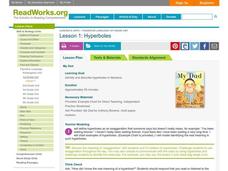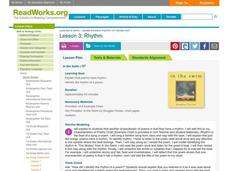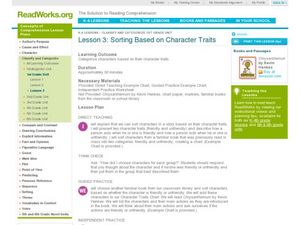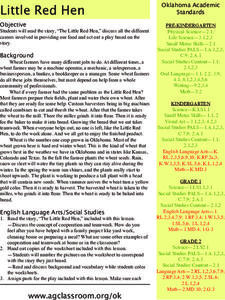Curated OER
Lesson 3: Looks, Actions, and Feelings
Remember that boy David from the David, No! books? He's back, and youngsters draw a picture of him from a scene in the book David Goes to School. They write a sentence describing his appearance, actions, and feelings...
Curated OER
Hyperboles
Want to see the best instructional activity is the entire universe? Who doesn't love to exaggerate now and then? Get your class cozy with hyperbole as you read the story My Dad by Anthony Browne. During the reading you'll chart...
Curated OER
Nature
Discuss what makes a myth with your class as you read two titles that exemplify the genre. Two myths that explain events in nature are read and charted, focusing on details from the text. The lesson culminates in a practice activity...
Curated OER
Rhythm
One of the most fun characteristics of a poem is rhythm! Little ones will clap along as you read a poem, to determine the rhythm of the piece. The book In the Swim is used throughout the lesson; it contains fish themed poems that kids...
Curated OER
Identifying Problems and Solutions in the Story
Students explore story structure. In this Groundhog's Day story structure literacy lesson, students listen to the story Groundhog Stays Up Late by Margery Cuyler, then pause half way through the story to identify the problem and...
Curated OER
Identifying When Using Evidence from the Text
First listen to the story The Meanest Thing to Say and then answer question regarding when the story takes place. Using evidence from the text, text clues and pictures to order events and find the time frame of the story is what this...
Curated OER
Oklahoma Stone Soup
Class members complete activities related to the story "Oklahoma Stone Soup." First, pupils read, discuss, and answer questions about the story. Next, to incorporate math into the lesson, learners make stone soup using a variety of...
Curated OER
Picture Fists Full of Kisses
Ease children's back-to-school jitters with this primary grade lesson based on the book The Kissing Hand by Ruth E. Harper. Starting off with a singing of the song "I Wish I Had a Little Red Box", children go on to discuss and...
Curated OER
Lesson 1: Actions
Action is what characters in books do or say. Little ones discuss what actions are and then examine the book David, No! to identify them. As they read through the book, they chart all of David's actions. They write a sentence and draw a...
Curated OER
Lesson 3: Gods and Goddesses
Exploring and characterizing myths can be fun. The class reads a version of "Pandora's Box," add to their myth chart, and discuss how gods and goddesses are commonly used in mythology. They work in groups to identify the gods and...
Curated OER
Sorting Based on Character Traits
Characters from a story can be sorted by their traits, just like shapes or objects can. First the children list several character traits on a chart, they read a familiar story, and then sort the characters by their friendly or unfriendly...
Curated OER
Lesson 3: Comparing and Contrasting two Characters from a Book
One book, two main characters, and a Venn diagram; it's time to discuss similarities and differences in order to compare and contrast two characters from the same book. The class listens to the book Toot and Puddles as they complete a...
Curated OER
Identifying Information from Fiction
A solid comprehension strategy is used to aid learners in better understanding what they read. They are introduced to the way good readers ask questions while their reading to understand what's going on in a story. The class reads...
Curated OER
Little Red Hen
Pupils listen to a teacher reading of The Little Red Hen, identify the story elements and sequence them. They talk about different jobs associated with providing food and act out a play based on the story. Be aware that although several...
Curated OER
Betsy Bear Does a Trick
Help your youngsters develop an understanding of sequence and order of events in a story, with this fun simple tale about Betsy the Bear and her tricks. They will cut out images of Betsy and match them to the correct description and...
ReadWriteThink
Read Write Think: Draw a Story: Stepping From Pictures to Writing
Help young learners move from drawing pictures into writing simple stories. Good plan for having students put pictures in sequential order and teaching them about sequential order.
PBS
Pbs Teachers: Story Writing With Arthur
This series of 12 downloadable activities teach students some basics of story writing, using books or videos from the PBS "Arthur" series as a springboard. Activities include creating story maps, asking questions about characters and...
Annenberg Foundation
Annenberg Learner: Interactives: Elements of a Story
Explore the elements of a story using the well-known Cinderella story as source material. Learn about setting, character, sequence, exposition, conflict, climax, and resolution.
Utah Education Network
Uen: All About Me Story
This series of lessons engages young scholars in autobiographical writing. Students will participate in pre-writing, drafting, and publishing stories about their lives.
Better Lesson
Better Lesson: Come Along Daisy
Learners will engage in discussions about story details and write an informational piece about the events in the story "Come Along Daisy".
Read Works
Read Works: Lesson: Author's Purpose: Cause and Effect Signal Words
[Free Registration/Login Required] With this lesson plan, young scholars can learn how several authors can write about the same topic, but for different purposes.
Better Lesson
Better Lesson: Who Writes the Story? Who Does the Illustrations?
Students will learn to identify the author and illustrator on the cover of the book and orally define their role. Pictures and video of the lesson in action are included.
Better Lesson
Better Lesson: Revise and Revisit: Butterflies
Young scholars will take a previously created paragraph and edit it to make it better by adding details, definitions, a topic sentence, or a closure to an informational paragraph. Resources include a PowerPoint presentation and pictures...
Other
Pic lits.com: Inspired Picture Writing
This innovative resource offers a wide selection of photographs and words to stimulate writing in an interactive format.
























